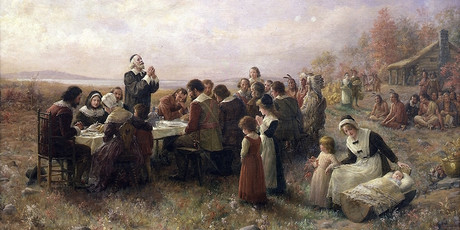How an Irish Ship Saved the Pilgrims (And Maybe Started Thanksgiving)
Posted by Andy Peters on 27th Nov 2019
Did an Irish ship loaded with life-saving supplies lead to the first celebration of Thanksgiving in America? We may never know the official answer to that question, but it’s safe to say that Irish sailors played a big role in helping the early European settlers.
The ship was known as Lyon. Details are few and there is certainly much that is not known. But enough has been passed down through generations to give credence to the theory that the Lyon was involved in helping provide essential food and supplies to the early settlers and they held a celebration in commemoration of that help. In a nutshell, that Irish ship saved the settlers from starvation and death, allowing them to hold a celebration that may have been the first instance of Thanksgiving in the colonies.
The story told for decades to U.S. schoolchildren of how Thanksgiving began in America goes something like this. The English Pilgrims arrived on the Mayflower at Plymouth Rock in Massachusetts in 1620. They weren’t the first Europeans to arrive in present-day America, but were one of the first and they made peace (initially) with the Wampanoag people who lived in the area for thousands of years. The Plymouth Colony had a successful harvest in 1621 and held a three-day fall festival to celebrate the occasion. Both the English Pilgrims and Native Americans were on hand for this event, which many have deemed the First Thanksgiving. The ceremony was based on the English tradition of days of prayer.
So where do the Irish come in? A decade later, the Plymouth Colony was struggling after difficult growing seasons. Many were subsiding almost exclusively on clams, mussels and nuts, the 18th century historian Thomas Prince wrote in The Annals of the Year 1631.
The settlers were in dire straits and in need of help. Thankfully, a ship called the Lyon had been sent to Plymouth by a Dublin merchant and arrived at the colony in time to help the starving settlers. The merchant’s daughter was married to one of the Pilgrims, according to historian John Cusack, writing for Irish America.
An entry in the 1877 chronicle Annals of North America by Edward Howland for February 15, 1631 supports this claim: “The Ship Lyon arrived at Nantasket, Massachusetts Bay. She brought twenty passengers and a large store of provisions. The 20th had been set apart as a day of fasting and prayer; the colony was suffering for want of provisions. In consequence of this timely arrival, the day was made one of thanksgiving.”
So which celebration or ceremony or dinner was the real Thanksgiving? Again, no historical texts exist to settle the discrepancy. And Thanksgiving is now, of course, observed on the fourth Thursday of every November.
But it was that ceremony that was held in 1631 that many historians say is the time and the place when Thanksgiving actually started. The historian Michael J. O’Brien says that it’s fair to conclude that Thanksgiving began with the Irish gift of provisions to the settlers, due in no small part to the lack of more compelling evidence otherwise.
Other accounts provide more evidence to this view. After all, many different communities in different parts of the country have staked claims to being home to either the first Thanksgiving ceremony, or one of the first, including Virginia and Texas. Thus, who’s to say which one was the first, or who was involved? Therefore, the idea that an Irish ship that delivered lifesaving provisions was celebrated around the same time as the tradition Thanksgiving myth makes it seem plausible that the ship’s arrival was the true genesis of the American holiday.
Even the date of Thanksgiving has never been permanently affixed to its place in November, lending credence to the theory that the true story of how Thanksgiving came to be will never be known. However, it was first named as a national holiday in 1789 by proclamation by George Washington. Later, President Abraham Lincoln in 1863, proclaimed that Thanksgiving was to be celebrated on the final Thursday of November. President Franklin Delano Roosevelt moved Thanksgiving up earlier in the calendar, to spread out the time between the holiday and Christmas. But merchants were in an uproar over the decision and Thanksgiving was later moved back to its current place on the calendar.
Suffice to say, Thanksgiving has become a permanent staple of American culture, some would say one of the lasting tributes to the early settlers of the country. And it’s without dispute that in America’s early days as a European colony, the English were one of the first and most predominant sources of immigrants and of course the disagreements among the American colonists and their British overseers was the source of the American Revolutionary War. But plenty more came from Ireland, Scotland, France ... you get the drift. The Irish were just as much an important part of the early settlement of America and perhaps were the inspiration for one of its most famous holidays.

